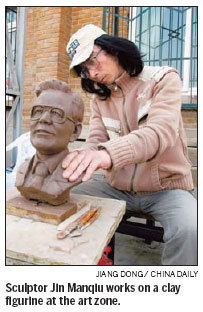People
A dream factory for street artists
Updated: 2011-04-21 07:53
By Sun Li (China Daily)
 |
Beijing's 798 Art Zone is a dream factory for the street artists who flock there.
Among the dreamers is sculptor Jin Manqiu, who every afternoon sets out clay figurines of celebrities to attract visitors to his pitch on the road leading to the art gallery hub.
"I just build an interesting clay shape to attract tourists," he says. "I don't really expect to finish one because it takes so much time."
The 42-year-old art college graduate from Hubei province's capital, Wuhan, used to work at a plaster-sculpture company in the province's Shiyan city.
He moved to Beijing two years ago to "make it big" and 798 was the natural choice to set up shop as it is "the country's premier art district".
"To run your business well, you have to know your market," says the longhaired artist, who offers his business card to anyone with an interest in his work, giving his phone number, e-mail, QQ (an instant messaging service) and Sina Weibo (the Chinese equivalent of Twitter) identities.
Though he specializes in making life-sized statues, Jin also designs and manufactures garden landscape sculptures. Clearly, his business is doing well.
"I've already got a studio in Beijing's outskirts and a few assistants who work for me," Jin says. "But I still come to 798, rain or shine, to promote myself and sell works."
Jin says several galleries in the art zone have closed in recent years and more street artists have moved in.
"Perhaps those gallery owners don't understand how the art market works," Jin says with a sly grin.
"It's pleasant to see these other street artists coming here because it helps form a market," Jin says. "It's no good for your business when you sit on your own, as it looks like there's no competition."
Wang Xinzhou is a street painter who sketches on a 798 sidewalk most days.
He says he fell in love with painting at an early age and was formally educated, but became a bank worker in Zhengzhou, capital of Henan province.
The 52-year-old belatedly discovered that painting "is the thing that I am truly into", and quit his job six years ago to move to Beijing and follow his dream.
"Not everyone is able to follow his dreams. I'm proud of myself because I did that."
Wang has sold many of his paintings in Beijing's various art zones but settled in the 798 art district in 2008.
"798 gave me a sense of vitality from an artistic point of view and I think it attracts people who appreciate the arts," Wang says.
"Though my works are different from those in the galleries, I believe art has no boundaries and someday my pieces will be exhibited in a gallery here."
Currently, Wang charges 40-50 yuan ($6.10-7.60) for a painting and claims he is only just "making ends meet".
He says he's not worried about the competition from fellow street artists.
"Yes, many of them have arrived here recently, but the number of visitors has also increased," he says.
"I'm glad 798 Art Zone has turned into a popular tourist destination. It means I have a better chance of visitors getting to know me.
"Maybe a gallery owner who has taste will notice that I'm unique and that will jumpstart my career."
China Daily
Specials

Models gear up car sales
Beauty helps steer buyers as market accelerates.

Urban breathing space
City park at heart of industrial hub positions itself as top tourism attraction

On a roll
Auto hub Changchun also sets its sight on taking lead in railway sector